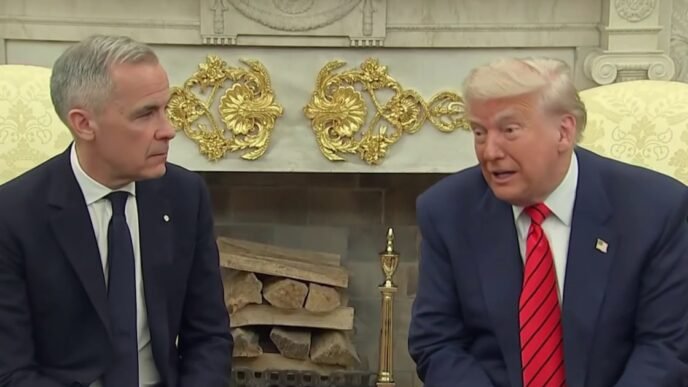At one time not so long ago, Sen. Bernie Sanders, I-Vt., was maybe seen as too progressive for most swing-district Democrats to appear with.
Not anymore.
When Sanders went through Pennsylvania over the weekend, one such Democrat, Rep. Chris Deluzio, was by his side on his “Fight Oligarchy” tour.
Follow live politics coverage here
In an interview Monday with NBC News, Deluzio argued that the old intraparty divide of moderate vs. progressive is over. Deluzio has himself straddled that split at times. But he’s also sought to grab the left’s mantle of economic populism as he’s won two terms in a district just outside of Pittsburgh.
Now, amid President Donald Trump’s second term, he sees the real battle not between the center and left but between fighters and wimps.
Deluzio argued that more populist positioning, citing his own push for an anti-corruption, anti-corporate and anti-monopoly platform, “is uniting more Democrats across the old ideological labels who understand that one, now is not the time to be a wimp, and that two, we’ve got to put the economic fight front and center.”
That Deluzio, who represents a D+3 district, according to the Cook Political Report, would appear with Sanders would’ve raised eyebrows in past cycles. The congressman said that, while he’s not sure how many Democratic officials feel differently about appearing on the trail with Sanders now, he doesn’t see much difference between his messaging and the Vermont senator’s.
Appearing with him in Harrisburg and Bethlehem over the weekend — on the other side of the state from his congressional district — Deluzio railed against “bootlicker politicians,” “the oligarchs in the White House and the boardroom” and “these phony patriots” he sees “waging a war on the American Dream.” And he called on Democrats to rally around a congressional stock trading ban as part of an anti-corruption push.
“Donald Trump understood that anger,” Deluzio said in Bethlehem of working-class disenchantment with the status quo. “He saw that wound in the American psyche. What does he offer? Snake oil of hate, division and autocracy. That’s not the way forward. We’re here to call out that bulls—.”
In the early days of Trump’s administration, Democrats were divided over how strongly to combat Trump, with some feeling the anti-Trump “resistance” of his first term contributed to his comeback the second time around. Yet as the president has moved to quickly enact his agenda of deconstructing the civil service, slashing federal funding to an array of programs and enacting sweeping global tariffs, many in the party have shifted.
“It’s not so much ideological, right?” Deluzio said in the interview. “It’s about style, and, of course, it is about substance too. Across the ideological spectrum from Sen. Sanders to Sen. [Elissa] Slotkin and anybody else who’s weighed in here, I think you’re seeing a pretty clear consensus among Democrats who get this, that you’ve got to be tough … You’ve got to be clear about who you’re fighting against.”
Slotkin, D-Mich., had pushed back recently on using the “oligarchy” framing to argue against Trump and his agenda, saying that many Americans don’t understand what an oligarchy — a form of government where power is held by a small group of people — is. Sanders hit back, telling NBC News’ “Meet the Press” that Americans “are not quite as dumb as Ms. Slotkin thinks they are.”
But Deluzio doesn’t think there is much of a divide there.
“Sen. Slotkin is someone who gets and has talked aggressively about Democrats needing this alpha energy, as she says, as Democrats should be fighting,” he said. “So I actually think it’s less of a division than some have reported it. … Whether you’re using ‘oligarch,’ ‘robber baron’ or ‘corporate jagoff,’ we know who we’re talking about. The American people know who we’re talking about here.”
Deluzio came under fire from some party activists and allies last month when House Democrats promoted a video of him on X describing how tariffs can be part of a plan to boost American manufacturing just two days after Trump announced his sweeping global tariffs that sparked a market selloff.
“I don’t think there’s much of a divide about Trump’s tariffs being really dangerous and hurtful,” he said in the interview. “We have to be able to say that, and actually I think it’s pretty powerful, coming from the Rust Belt, coming from Western Pennsylvania, that I can say that clearly. And then, I think we have to articulate, ‘well, what do we want to do differently?’ And for me, yes, targeted enforcement against countries like China and sectors like steel and ship-building, that’s part of it.”
“You also need the industrial policy at home,” he continued. “You need the incentives for American companies to invest here, and foreign companies to invest, and that is completely lacking in Trump’s trade approach. So I think Democrats have to articulate what we would do differently, too.”
Deluzio is seen as someone who could be a future statewide candidate in Pennsylvania. He spoke with NBC News days after New York Magazine offered an in-depth story on Sen. John Fetterman, D-Pa., where staffers alleged that his recovery from a stroke and subsequent mental health episodes has taken a step backward, causing internal tension with his team and even his wife, Gisele.
Asked if he believed Fetterman can continue serving the state in the Senate, Deluzio said he would wait to render judgment until Fetterman addressed the story.
“Number one, I want him to be healthy, and he’s been pretty honest so far about his struggles and treatment,” Deluzio said. “I want to give him a chance to respond, and I haven’t seen him say anything yet, so I want to give him a chance to do that.”
After the interview, Fetterman told NBC News on Tuesday morning that the story was built on “one source” with “a couple anonymous sources,” describing it as a “hit piece from a very left publication.”
“There’s really nothing more to say about it,” he added.













